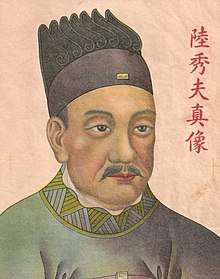Lu Xiufu
Lu Xiufu (8 November 1236 – 19 March 1279),[1] courtesy name Junshi (君实/君實), was a Chinese statesman and military commander who lived in the final years of the Song dynasty. Originally from Yancheng (present-day Jianhu County) in Jiangsu Province,[2] along with Wen Tianxiang and Zhang Shijie, he is regarded as one of the 'Three Loyal Princes of the Song' (大宋三忠王).[3]
 | |
| Grand Chancellor of the Song Dynasty | |
| In office 10 May 1278 – 19 March 1279 | |
| Monarch | Emperor Bingdi |
| Preceded by | Wen Tianxiang |
| Personal details | |
| Born | 8 November 1236 Yancheng, Jiangsu, China |
| Died | March 19, 1279 (aged 42) Yamen, Guangdong, China |
| Lu Xiufu | |||||||
|---|---|---|---|---|---|---|---|
| Traditional Chinese | 陸秀夫 | ||||||
| Simplified Chinese | 陆秀夫 | ||||||
| |||||||
Life
In 1256, together with Wen Tianxiang, Lu passed the imperial examination, thus becoming a "presented scholar" or jinshi, and thereafter joined the Ministry of Rites as a vice-minister.
Mongol Conquest
On 18 January 1276, the Mongol general Bayan showed up with his army outside Lin'an. In a desperate attempt to make peace, the Song imperial court sent Lu Xiufu to negotiate but he was forced to surrender and then was released.
The capital of the Song dynasty at Lin'an in Zhejiang fell to Mongol invaders from the north in 1276, and the five-year-old Emperor Gong was taken prisoner. Together with Chen Yizhong, Zhang Shijie and Consort Yang, amongst others, Lu took care of the two sons of Emperor Duzong, seven-year-old Zhao Shi (赵昰) and four-year-old Zhao Bing (赵昺). Later the same year at Fuzhou in Fujian Province, Zhao Shi was enthroned as Emperor Duanzong and began ruling under the era name "Jingyan" (景炎; literally: "bright flame"). Emperor Duanzong appointed Lu as military advisor to the Privy Council with the task of continuing resistance to the Mongols.
After Emperor Duanzong died at the age of ten in 1278, Lu and Zhang Shijie together enthroned his younger brother Zhao Bing as Emperor Bing whilst Consort Yang (now Empress Dowager Yang) effectively ran the court from behind a screen. Lu became Left Chancellor (左丞相) and ran the government together with Zhang Shijie.
In 1279, Mongol forces led by Zhang Hongfan launched a large scale naval offensive against Song forces at Mount Ya (present-day Yamen), forcing Emperor Bing to flee. During the ensuing Battle of Yamen on March 19, 1279, the entire Song army and navy were totally wiped out. When the seven-year-old Emperor Huaizong saw the outcome of the naval battle, he was shocked and slightly rebuked the disorder of his armed forces by saying "they should have coordinated their attack and fought as a unit."
Lu, unwilling to be taken captive by the Mongols, first ordered his younger wife to commit suicide then advised Emperor Huaizong:
The affairs of our nation lie in ruins and our country is destroyed. Your Majesty, please do not continue the disastrous policies of your predecessor Emperor Gong whose presence in Dadu is an unbearable shame, we cannot again bear such an insult.
With that, Lu gave the young emperor his seal, picked him up in his arms and jumped from a cliff into the sea, killing them both. Many imperial concubines and ministers also died and by July there were tens of thousands of corpses floating in the sea.[4] Thus ended the Song Dynasty and begun the actual rule of the Yuan.
Legacy
Lu's descendants moved through many places before settling down in Qiangang Village (钱岗村), Conghua City, Guangdong Province.
Today in Jiangmen City, Guangdong Province there stands a memorial hall to the 'Three Loyal Princes of the Song' (大宋三忠王). There is also a shrine to the three heroes in the Shuangxi District of New Taipei City, Taiwan. Built in 1868 during the reign of the Tongzhi Emperor in the Qing dynasty, the Three Loyalists Temple (三忠廟/三宗庙) is the religious center of the township.
See also
- History of the Song dynasty
- Society of the Song dynasty
- Culture of the Song dynasty
- List of Song dynasty emperors
References
- McDermott, Joseph P. (editor), (1999), State and Court Ritual in China, University of Cambridge Oriental Publications, ISBN 978-0-521-62157-1, ISBN 0-521-62157-7, p. 281
- http://www.tionghoa.com/167/lu-xiufu/
- 当代海外华人社团研究 (in Chinese). 厦门大学出版社. 1995. p. 352. ISBN 9787561509876.
- Matthew Bennett (1998), The Hutchinson dictionary of ancient & medieval warfare, Taylor & Francis, 1998, ISBN 978-1-57958-116-9, p. 55
Further reading
- Gascoigne, Bamber (2003), The Dynasties of China: A History, New York: Carroll & Graf, ISBN 1-84119-791-2
- Giles, Herbert Allen (1939). A Chinese biographical dictionary (Gu jin xing shi zu pu). Shanghai: Kelly & Walsh. (see here for more)
- Gernet, Jacques (1982), A history of Chinese civilization, Cambridge: Cambridge University Press, ISBN 0-521-24130-8
- Kruger, Rayne (2003), All Under Heaven: A Complete History of China, Chichester: John Wiley & Sons, ISBN 0-470-86533-4
External links
| Wikimedia Commons has media related to Lu Xiufu. |
- Lu Xiufu memorial hall
- China 7 BC To 1279
- Song Dynasty at China Heritage Quarterly
- Song Dynasty at bcps.org
This article is based on a translation of 陆秀夫 in Chinese Wikipedia.